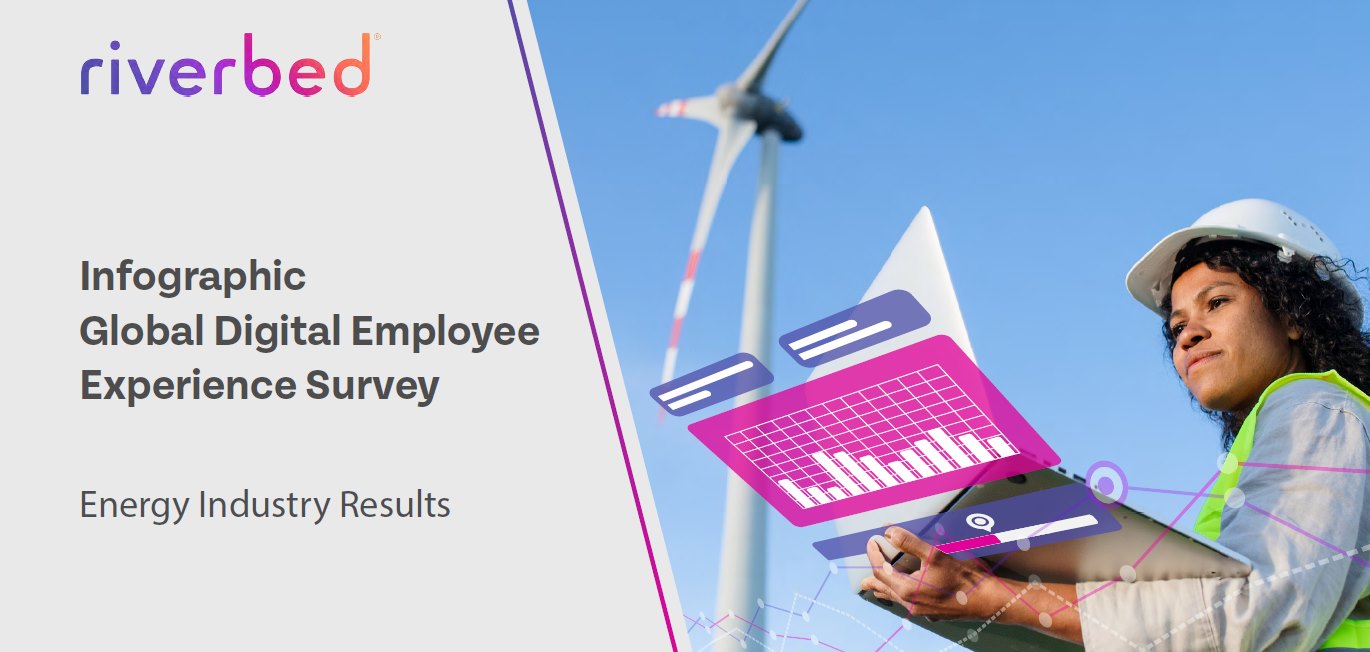
Industry CIOs are driving innovation, digitalization and automation, improving digital employee experiences to protect the business and retain talent
Riverbed, a leader in Unified Observability, presented the results of the Riverbed Global Digital Employee Experience (DEX) Survey 2023 for the Energy and public utilities sector. The survey found that industry IT and business leaders are investing in improving the digital experience of employees and customers as an urgent priority. With the evolution of market dynamics, competition is fierce and to remain competitive it is necessary to guarantee excellent DEX so that staff can actively collaborate in geographically distributed working environments. A substantial majority (93%) of respondents agree that ensuring seamless DEX is critical to remaining competitive, at a time when energy companies are turning to renewables and ramping up digital initiatives transformation and sustainability.
Industry leaders look to DEX to retain the internal team
 Identifying ways to offer an ideal DEX is vital given the generational shift and entry of “digital natives” – Millennials and Gen Z – into the workforce. In particular, 85% of the leaders interviewed believe that in the next five years it will be necessary to offer optimal digital experiences to the new generations, and 65% say that failing to do so could have an impact on the company's reputation and be a source of critical issues. Additionally, 66% of respondents say Millennials and Gen Z might consider leaving the company if their digital needs aren't being met.
Identifying ways to offer an ideal DEX is vital given the generational shift and entry of “digital natives” – Millennials and Gen Z – into the workforce. In particular, 85% of the leaders interviewed believe that in the next five years it will be necessary to offer optimal digital experiences to the new generations, and 65% say that failing to do so could have an impact on the company's reputation and be a source of critical issues. Additionally, 66% of respondents say Millennials and Gen Z might consider leaving the company if their digital needs aren't being met.
Outdated technology and skills shortages are holding businesses back
Despite the awareness that DEX is an essential tool for overcoming challenges and achieving objectives, 98% of managers interviewed indicated at least one major obstacle to creating an optimal DEX. Key obstacles include: inadequate observability tools, talent/skills shortages, and inadequate SaaS services. Furthermore, 83% say that outdated technology has a direct impact on growth and internal performance. 43% believe they are understaffed while 34% have a sufficient number of employees, but the latter do not have the necessary skills to carry out the assigned tasks. However, 76% of those with unskilled employees have allocated a budget to retrain staff.
Security remains a major concern
Compared to other sectors examined in the report, energy sector leaders were particularly concerned about the security of IT infrastructures. Hybrid architectures and legacy technologies can be difficult to monitor and manage. In fact, 48% of respondents said security vulnerabilities are their biggest IT concern and 44% will increase their investments in security solutions, the highest figure of all verticals surveyed.
Unified observability reduces IT complexity and provides robust DEX
CIOs in the energy sector increasingly find themselves playing an essential role not only in the server room, but also at management level. In fact, 82 percent of respondents said the relevance of IT teams to the board of directors has changed in recent years, and 87 percent of IT leaders surveyed said they have a role in shaping business strategy. That's because CIOs and IT teams have the tools to improve employee experience, reduce security risks, and improve operational efficiency through greater network visibility. These capabilities are used to focus attention and investment on unified observability. 90% of leaders surveyed said they recognize the importance of this tool in their company's ability to deliver seamless digital experiences. Of all the industries surveyed, energy managers were also the most optimistic (92%) about the potential of unified observability technology and automation to help close the skills gap, demonstrating that technology can help them achieve even the most challenging goals, while delivering better experiences for employees and customers.
“The Global DEX Survey 2023 confirmed that it has never been more important for IT teams to have complete observability and insights into their data, in order to offer an optimal digital experience for employees,” he explains Jim Gargan, CMO di Riverbed. “By leveraging unified observability and AI, industry leaders can make informed decisions that allow them to better meet employee digital expectations, while building customer loyalty, remaining compliant and competitive, and improving operations.”
The survey interviewed 1,800 IT decision makers (ITDMs) and business decision makers (BDMs) in 10 countries and seven sectors, including 100 leaders in the Energy and Utilities sector, analyzing generational expectations, the topic of hybrid work, the evolution of the role of IT, the challenges and strategies to offer an ideal DEX. The survey was conducted by Sapio Research in May 2023.
To find out how IT and business decision makers are approaching the Digital Employee Experience, see the full report: riverbed.com/DEXSurvey2023.






